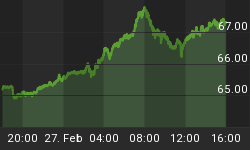A slow Monday, and the S&P could barely manage a +0.3% rally. That's tantamount to a selloff, these days, as the all-time nominal highs are a mere 20 points away. I'm not joking: with stocks up 9.1% on the year, the S&P is averaging +0.19% per day, which means the all-time highs ought to be reached by next Wednesday.
Meanwhile, our measure of valuation for equities has reached levels not seen since July of 2011. The expected compounded after-inflation return for the S&P 500, inclusive of dividends, is just 2.00% (it got to 1.81% in July 2011 - and, for the record, it stood at 0.83% at the end of 2006).
The VIX tumbled today to the lowest level since April of 2007 (see chart, source Bloomberg), two weeks after Fed Chairman Bernanke told Congress that the "subprime crisis" was likely to stay "contained" (which it did, in roughly the same sense that the universe itself has a boundary).

Now, I don't want to follow the usual course and list all of the things we could be worrying about (Italy, Cyprus, France, Iran, North Korea...) to somehow argue that prices are too high. After all, there's always something to worry about. No, that's not my argument at all. My argument is that prices are too high regardless of what the news is.
Over the next ten years, compounded real returns after inflation will likely be in the neighborhood of 2% per annum. They could reach 5% per annum, but they could be -3% per annum with equal probability. Note that these are real returns I am speaking of, so there is no reason stocks can't continue to reach new nominal highs especially if consumer prices continue to accelerate.
(And here's an odd fact: while equity market volumes over the last few years have been shrinking persistently, the gap between 2012 and 2013 has been narrowing over the last month and a half. That is, volumes are still running about 78mm shares/day below the year-to-date pace in 2012, but at the end of January that figure was 113mm shares/day. So volume is still shrinking, but no longer monotonically.)
So I'm not sure when we are going to get a significant correction on the order of late 2011 (~20%), but we are overdue. Frankly, if I thought the correction was likely to be no more than 20%, I probably wouldn't even be particularly concerned, because 10% and 20% corrections happen in healthy markets. But I can't discount the possibility of a 2000-2002 or 2007-2008 sort of decline. The conditions are "right" for just such an occurrence, unfortunately.















